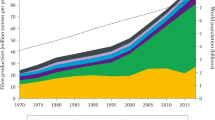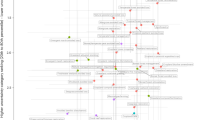Abstract
Accurate models of pro-environmental behaviour can support environmental sustainability. Previous studies identifying the psychological predictors of pro-environmental behaviour rarely accounted for environmental impact. We studied the greenhouse gas emissions of clothing purchasing across four countries. Clothing purchasing is responsible for 2–3% of global emissions and severe, local environmental degradation. We found, using multiple regression analyses, that psychological factors like attitudes and personal norms strongly predicted a common self-reported behaviour scale of clothing purchasing but only weakly predicted clothing-related greenhouse gas emissions. This result challenges widespread inferences using pro-environmental behaviour scales and suggests that psychological factors may be a poor predictor of clothing-related environmental impact.
This is a preview of subscription content, access via your institution
Access options
Access Nature and 54 other Nature Portfolio journals
Get Nature+, our best-value online-access subscription
$29.99 / 30 days
cancel any time
Subscribe to this journal
Receive 12 digital issues and online access to articles
$119.00 per year
only $9.92 per issue
Buy this article
- Purchase on Springer Link
- Instant access to full article PDF
Prices may be subject to local taxes which are calculated during checkout


Similar content being viewed by others
Data availability
The dataset analysed in the present study is not publically available due to data protection policies specified by the funding projects. The dataset is available from the corresponding author upon request.
Code availability
The analysis code and study materials are available via the Open Science Framework: https://osf.io/ucwjs/.
References
Capstick, S. et al. in Emission Gap Report 2020 Ch. 6 (UNEP, 2020).
van Vuuren, D. P. et al. Alternative pathways to the 1.5 °C target reduce the need for negative emission technologies. Nat. Clim. Change 8, 391–397 (2018).
Ajzen, I. The theory of planned behavior. Organ. Behav. Hum. Decis. Process. 50, 179–211 (1991).
Stern, P. C., Dietz, T., Abel, T., Guagnano, G. A. & Kalof, L. A value–belief–norm theory of support for social movements: the case of environmentalism. Hum. Ecol. Rev. 6, 81–97 (1999).
Klöckner, C. A. A comprehensive model of the psychology of environmental behaviour—a meta-analysis. Glob. Environ. Change 23, 1028–1038 (2013).
Klöckner, C. A. & Blöbaum, A. A comprehensive action determination model: toward a broader understanding of ecological behaviour using the example of travel mode choice. J. Environ. Psychol. 30, 574–586 (2010).
Nielsen, K. S., Cologna, V., Lange, F., Brick, C. & Stern, P. C. The case for impact-focused environmental psychology. J. Environ. Psychol. 74, 101559 (2021).
Kaiser, F. G. & Wilson, M. Goal-directed conservation behavior: the specific composition of a general performance. Pers. Individ. Differ. 36, 1531–1544 (2004).
Brick, C., Sherman, D. K. & Kim, H. S. “Green to be seen” and “brown to keep down”: visibility moderates the effect of identity on pro-environmental behavior. J. Environ. Psychol. 51, 226–238 (2017).
Dietz, T., Gardner, G. T., Gilligan, J., Stern, P. C. & Vandenbergh, M. P. Household actions can provide a behavioral wedge to rapidly reduce U.S. carbon emissions. Proc. Natl Acad. Sci. USA 106, 18452–18456 (2009).
Allen, S., Dietz, T. & Mccright, A. M. Measuring household energy efficiency behaviors with attention to behavioral plasticity in the United States. Energy Res. Soc. Sci. 10, 133–140 (2015).
Kim, H.-S. & Damhorst, M. L. Environmental concern and apparel consumption. Cloth. Text. Res. J. 16, 126–133 (1998).
Bleys, B., Defloor, B., Van Ootegem, L. & Verhofstadt, E. The environmental impact of individual behavior: self-assessment versus the ecological footprint. Environ. Behav. 50, 187–212 (2018).
Kennedy, E. H. et al. Are we counting what counts? A closer look at environmental concern, pro-environmental behaviour, and carbon footprint. Local Environ. 20, 220–236 (2015).
Moser, S. & Kleinhückelkotten, S. Good intents, but low impacts: diverging importance of motivational and socioeconomic determinants explaining behavior, energy use, and carbon footprint. Environ. Behav. 6, 626–656 (2018).
Ivanova, D. et al. Quantifying the potential for climate change mitigation of consumption options. Environ. Res. Lett. 15, 093001 (2020).
Peters, G., Li, M. & Lenzen, M. The need to decelerate fast fashion in a hot climate—a global sustainability perspective on the garment industry. J. Clean. Prod. 295, 126390 (2021).
Niinimäki, K. et al. The environmental price of fast fashion. Nat. Rev. Earth Environ. 1, 189–200 (2020).
Kraha, A., Turner, H., Nimon, K., Zientek, L. R. & Henson, R. K. Tools to support interpreting multiple regression in the face of multicollinearity. Front. Psychol. 3, 44 (2012).
Gwozdz, W., Nielsen, K. S. & Müller, T. An environmental perspective on clothing consumption: consumer segments and their behavioral patterns. Sustainability 9, 762 (2017).
Sohn, J., Nielsen, K. S., Birkved, M., Joanes, T. & Gwozdz, W. The environmental impacts of clothing: evidence from United States and three European countries. Sustain. Prod. Consum. 27, 2153–2164 (2021).
Nielsen, K. S. From prediction to process: a self-regulation account of environmental behavior change. J. Environ. Psychol. 51, 189–198 (2017).
Roos, S., Sandin, G., Zamani, B., Peters, G. & Svanström, M. in Textiles and Clothing Sustainability (ed. Muthu, S. S.) 1–45 (Springer, 2017).
A New Textiles Economy: Redesigning Fashion’s Future (Ellen MacArthur Foundation, 2017); https://ellenmacarthurfoundation.org/a-new-textiles-economy
R Core Team R: A Language and Environment for Statistical Computing (R Foundation for Statistical Computing, 2012); https://www.r-project.org/
Behrendt, S. Lm.beta: Add Standardized Regression Coefficients to lm-Objects. R package version 1.5-1 https://cran.r-project.org/web/packages/lm.beta/lm.beta.pdf (2014).
Joanes, T. Personal norms in a globalized world: norm-activation processes and reduced clothing consumption. J. Clean. Prod. 212, 941–949 (2019).
Joanes, T., Gwozdz, W. & Klöckner, C. A. Reducing personal clothing consumption: a cross-cultural validation of the comprehensive action determination model. J. Environ. Psychol. 71, 101396 (2020).
Nielsen, K. S., Gwozdz, W. & De Ridder, D. Unraveling the relationship between trait self-control and subjective well-being: the mediating role of four self-control strategies. Front. Psychol. 10, 706 (2019).
Nielsen, K. S., Bauer, J. M. & Hofmann, W. Examining the relationship between trait self-control and stress: evidence on generalizability and outcome variability. J. Res. Pers. 84, 103901 (2020).
Nielsen, K. S. & Bauer, J. M. The merits of goal support as a self-control strategy. Soc. Psychol. Personal. Sci. 10, 671–680 (2019).
Acknowledgements
We thank P. C. Stern and T. Dietz for helpful discussion and feedback. K.S.N., W.G. and T.J. are grateful for the funding provided by the Trash-2-Cash project (grant no. 646226) funded by the European Commission under the Horizon 2020 research and innovation programme and the Mistra Future Fashion Project Phase II funded by the Swedish Mistra Foundation. K.S.N. also gratefully acknowledges financial support from the Carlsberg Foundation, grant no. CF20-0285.
Author information
Authors and Affiliations
Contributions
All authors contributed to the conceptualization of the research. K.S.N., T.J. and W.G. collected the data. K.S.N. analysed the data and wrote the manuscript. C.B., F.L., W.H., T.J. and W.G. provided critical comments and revisions. All authors approved the final manuscript.
Corresponding author
Ethics declarations
Ethics statement
No ethics approval was obtained for the present study as this was not common practice nor institutionally available at Copenhagen Business School at the time of data collection. However, the study posed no risks to the participants nor included deceit and an informed consent was obtained from all participants.
Competing interests
The authors declare no competing interests.
Peer review
Peer review information
Nature Sustainability thanks Thijs Bouman, Stephanie Moser and the other, anonymous, reviewer(s) for their contribution to the peer review of this work.
Additional information
Publisher’s note Springer Nature remains neutral with regard to jurisdictional claims in published maps and institutional affiliations.
Supplementary information
Supplementary Information
Supplementary Methods, Tables 1–14 and Figs. 1 and 2.
Rights and permissions
About this article
Cite this article
Nielsen, K.S., Brick, C., Hofmann, W. et al. The motivation–impact gap in pro-environmental clothing consumption. Nat Sustain 5, 665–668 (2022). https://doi.org/10.1038/s41893-022-00888-7
Received:
Accepted:
Published:
Issue Date:
DOI: https://doi.org/10.1038/s41893-022-00888-7
This article is cited by
-
Realizing the full potential of behavioural science for climate change mitigation
Nature Climate Change (2024)
-
Morality meets menu: investigating the impact of moral appeals on vegetarianism through a conjoint survey experiment
Climatic Change (2024)
-
The Association Between Selfishness, Animal-Oriented Empathy, Three Meat Reduction Motivations (Animal, Health, and Environment), Gender, and Meat Consumption
Food Ethics (2024)
-
Fostering sustainable investments through micro-investing platforms
Scientific Reports (2023)
-
A randomized trial testing the effectiveness of virtual reality as a tool for pro-environmental dietary change
Scientific Reports (2022)



